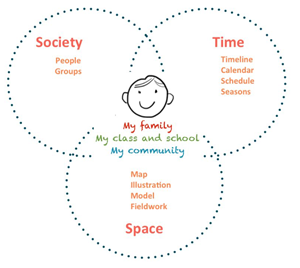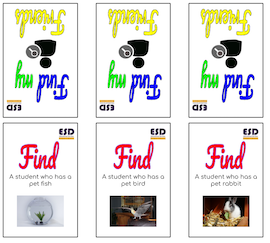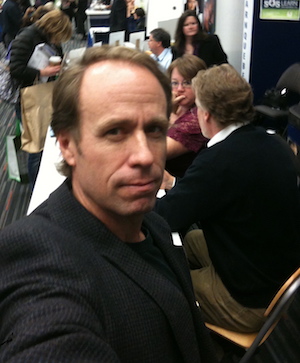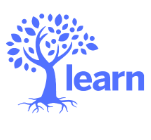Elementary Social Sciences
Welcome to Elementary Social Sciences. Browse the sections below to find program content, teaching strategies, and printable graphic organizers, as well as direct links to our resource sites like Cartograf and Societies & Territories. (Find Secondary sections here)
Updates on the Societies and Territories Cycle 2/3 Site
Latest Gaming Activities on the S and T site!
Game Challenge: New France 1645 -1745 - Can you tell what has changed?
Identifying and Explaining Changes Board Game- Iroquoians around 1500 and 1745
Includes Game Instructions. | Board | Google Slides version of cards | Score Sheet.
Students can refer to new 1500s-big-ideas-and-concepts-definition-cards as well.
1980s Connect the Fact Game. Access the game page. Access the definitions.
Inuit around 1980s added Spot It game ideas. Click to access PDF of cards.
I-SPY Style Game: The Prairies around 1905
Recently we did a presentation on Game-based learning for Elementary Teachers in Quebec. Feel free to browse our Google Slide deck here.
Updated site sections and Features!
An events timeline that surveys key events throughout the Elementary Program.
An updated glossary section with key words available as definition flash cards.
(Click here to open the Google Slides deck directly)
Feature Section: Be a History Detective! Image & Document Investigations
Try these quick discussion challenges, ask students to investigate, and to search for clues within a set of images or within other types of documents. Here are the first few examples that you will start to find posted on the Societies web site in their appropriate sections!
Iroquois 1500 – Concepts and Big ideas (LEARN/RSB)
Mi’kmaq 1980 – Concepts and Big ideas (LEARN)
Inuit 1980 – Concepts and other Big Ideas (LEARN/RSB) | FR
Inca Technology around 1500 (LBPSB) | FR
The Sachem and the War Chief (LBPSB) | FR
Catholic Missionaries (LBPSB) | FR
Commerce for the Iroquois 1745 (LBPSB) | FR
New France & the 13 colonies 1745 (LBPSB) | FR
City life in the 1800s (LBPSB) | FR
For other additions and updates to Societies and Territories:
Go to the Societies & Territories Site
Interested in Mapping! Check out Cartograf!
Several useable sample Cartograf scenarios exist for use in Elementary Geography, History & Citizenship, and even in ELA and FLS! Check them out via the main page of our Cartograf Mapping Tool. Here are just a few examples:
- At Home Activity: A place i have visited
- English territories in North America, 1763 (LPBSB)
- The Quebec Act, 1774 (LBPSB)
- The Constitutional Act of 1791 (LBPSB)
- Explore Nunavik: The Inuit around 1980 and 2020
- Compare Quebec in 1905 and 1980 (LBPSB)
- The Seigneurial System (RECITUS)
- Nationalization of Electricity (LBPSB)
- Indigenous Territories in 1500 (RECITUS)
- Montreal in 1820 (RECITUS)
- Quebec City as Heritage site
- Take me to your culture! (EMSB)
- Map your Literature Circle Novel (EMSB)
- Map your Author (EMSB)
- Trace the Voyage of the Odeyak (EMSB)
- Informational Text: Travel Pamphlet
- How did Indigenous people occupy the land? (RECITUS)
- Mercantilism trade and key players
- Rebellions of 1837-38
- Texte incitatif. Projet: l’agence de voyage
Recently we did a presentation on Cartograf for Elementary Teachers in Quebec. Feel free to browse our Google Slide deck here.
Elementary Social Sciences - Teaching and Learning Tools
| New for 2020: |
Cycle 1 Materials
Building My World
 Building My World (BMW) offers inquiry paths for developing the Social Science competency in Cycle 1. This competency lays the foundation for more formal study later on. Designed as cross-disciplinary, BMW inquiry activities develop competencies from other subjects including ELA, FLS, Personal Development, Science and Technology, as well as the Arts. Download
Building My World (BMW) offers inquiry paths for developing the Social Science competency in Cycle 1. This competency lays the foundation for more formal study later on. Designed as cross-disciplinary, BMW inquiry activities develop competencies from other subjects including ELA, FLS, Personal Development, Science and Technology, as well as the Arts. Download ![]()
Find my friends Game

![]()
Cycle 2 and 3 Resources and Strategies
Societies & Territories: An Elementary student content website!
The Societies and Territories web site is an English adaptation of the RECITUS Sociétés et Territoires. Texts and images are organized by societies covered in the QEP programs, and also in such a way as to facilitate comparisons over time and between other cultures. See the most recent updates: Go to Site![]()
Teachers, will also find tools many tools and strategies stored in the various teacher sections in the top menu. Go to site![]()
Cartograf Mapping Site
The updated LEARN-RECIT Cartograf site is now bilingual, containing instructions for student use and various sample mapping scenarios in both English and French! Notre nouveau site LEARN-RECIT Cartograf est maintenant bilingue et contient divers exemples de scénarios cartographiques en anglais et en français ! Go to the site![]()
Or visit directly some of our English sample scenarios listed here:
- Compare Quebec in 1905 and 1980 (LBPS) Go to page

- The Seigneurial System (RECITUS Go to page

- Nationalization of Electricity (LBPSB Go to page

- Amerindian Territories in 1500 (RECITUS Go to page

- Montreal in 1820 Go to page

- Comparer le Québec de 1905 et 1980 (LBPSB) Go to page

- La nationalisation de l'électricité (LBPSB Go to page

- Le territoire des amérindiens en 1500 (RECITUS) Go to page

- Le régime seigneurial (RECITUS Go to page

- Montréal en 1820 (RECITUS) Go to page

Consider also the Secondary/level scenarios:
- Mercantilism trade and key players Go to page

- Le commerce des fourrures en Nouvelle-France Go to page

Graphic Organizers storehouse
As mentioned above, various organizers are available via Teacher Strategies menu on the S & T site. However, where possible we also gather all our Graphic Organizers and organize them according to various Historical Thinking skills in the Secondary section here: Go to page![]()
Evaluation Tools
Summary documents, icons, and graphics for Intellection Operations:
- Word Document with small icons for Evaluation of Learning: Download ![]()
See also Sophie Lussier of LBPSB's French version. Download ![]()
- Large printable I.O. and Poster versions: Download EN ![]() Download FR
Download FR ![]()
- A Poster produced originally by Hélène La Branche of the CSHC: Download ![]()
- New: RECITUS Badge Guides, Student Worksheets for I.O. practice, and sample document-based activities, now all adjusted for Elementary-level Social Sciences. Visit Intellectual Operations Guides page on the S and T site! Go to page![]()
Professional Learning in Social Sciences
UDL in a Social Sciences Context:
Resources and Challenges in a Digital Age

Thinking about how you might adjust your History content and practices for all learning styles and experiences? LEARN online resources, in line with the secondary and new adult education history courses, can help you engage your students, explore, use and also interpret events for a variety of situations. Recently I shared a presentation on new templates structured around UDL with some teachers at the ACE Online summit. A video presentation on the First part on Engage is available at https://youtu.be/p5uS6IxKjfk
Social Sciences Online and in a Digital Age
Follow along as new learning scenario examples are added throughout the year. You will find tips, tricks and tools to help you teach online and in a digital age, using LEARN’s various resources, in response to the QEP program's approaches and according to an inquiry learning model. Visit the Secondary version ![]() Visit the Elementary Version
Visit the Elementary Version ![]() (Note too that in 2020 Paul Rombough also presented these strategies in an information online session available here.)
(Note too that in 2020 Paul Rombough also presented these strategies in an information online session available here.)
LEARN Blog entries for Social Sciences teachers
The LEARN blog is full of fascinating articles, all of which can contribute to your development as a teacher... and they are fun to read! Here are a few especially for us Social Sciences folk:
- Learning in Place: Working towards a local history learning toolkit Go to page

- Native-Land.ca - First Stop on a Journey Through Territory & Time Go to page

- Teachers as Cultural Facilitators in the Social Sciences Go to page

- Beginners No More: Social Sciences Online in a Digital Age Go to page

- Podcasts for Professional Development Go to page

- Feedback Street: Formative Assessment in History. Go to page

- Flipped History: A new approach for a new curriculum. Go to page

- History of Quebec and Canada – Planning for a new curriculum. Go to page

- Rapping Across the Curriculum. Go to page

- A Time and a Place for Elsewhere: The Role of Context... Go to page

- Geolocalize it: The global context of everything. Go to page

- iPadding… upstream! How do you manage it? Go to page

- 3 a.m. blogging, and why social sciences should be social, & public! Go to page

- Cartograf: Taking time for power mapping. Go to page

- Imagining a more meaningful and contributive future for education. Go to page

- History, reality…. and parties. Go to page

- Life stories in the classroom, and beyond! Go to page

Media and Podcasts in Social Sciences
After posting the excellent blog post by Matt Russell on Podcasts for Professional Development on the LEARN main blog, we started up a section dedicated to online media for PD for the Social Sciences teacher. Go to page![]()
Learning Communities & Professional Associations
Various associations and groups allow SocSci teachers to communicate and share, and to develop as professional learners. Here is a list of few key groups:
- Secondary 3 History Professional Community
Commununauté Histoire du Québec et du Canada. Go to site
- Quebec Association of Geography Teachers and Global Educators Go to site

- L'Association Québécoise pour la didactique de l'histoire-géographie. Go to site

- Association québécoise pour l’enseignement en univers social. Go to site

Visit and join their Facebook page and group too! Go to site
- Société des professeurs d'histoire du Québec. Go to site

- Le groupe des responsables de l'univers social. Go to site

Our Presentation on Historical Thinking (Matt R and Paul R)
Matt R. (WQSB) and I (Paul R from LEARN) presented on HIstorical Thinking concepts and strategies at LCEEQ a few years back. Here are a few ideas and resources we presented:
- Key links we mentioned:
- Main Historical Thinking Site on Historical Thinking.ca. And to order the book The Big Six
- The Historical Thinking concepts and specifically their guideposts document
- Our Google Slide documents
- Our Powerpoint temporarily available here
- Historical Event cards created with screenshots from Canadian Encyclopedia timelines
- Graphic Organizers:
- (Remarkable and Reveal) Single page and Huge Electronic versions for online collaboration are available below and in main-page Graphic Organizers section for Situate in Time and Space (Long version contains link to event cards)
- Consequences Placemat for Degree of Influence (and similar for Relevance). Available below and in main-page Graphic Organizers section for Cause and Consequence
- Historical Collection and Consequence Cards: Historical Collection #26 on American Revolution consequences. Including consequence cards to print (Note: Many other doc. collections via History of Quebec & Canada and the Communauté)
- A few video suggestions:
- What is Historical Thinking: for Historical Thinking skills, especially Evidence and Perspectives by @teachinghistory https://www.youtube.com/watch?v=mSJLmWnxrPg … Many of our "Intellectual Operations" involved. Good (U.S. History) examples
- The Importance of studying History: Historical Thinking Concepts overview and notion of a Growth Mindset, looking in the future. https://www.youtube.com/watch?v=iehEwDvwTfg
MEQ (Formerly MEES) Program Documents - Elementary Social Sciences
Programs
MEQ (previously MEES) main program site for Elementary Programs. Go to site ![]()
Geography, History & Citizenship Education Cycle 1,2,3 PDF. Download ![]()
Progression of Learning
Geography, History & Citizenship Education Cycle 1,2,3 PDF. Download ![]()
Frameworks for Evaluation (and weightings)
Report Card Weightings and Wording![]()
Contacts in Social Sciences
Paul Rombough

My main dossiers at LEARN include:
Social Sciences at all levels
Contact me at
prombough at learnquebec.ca
Some Twitter folks worth following
Paul Rombough LEARN @paulrombo
Matt Russell WQSB @historyrussell
Craig Bullett RECIT @RECIT4ESSB
Dan Hedges SWLSB @dhedgegrove
Joan Zachariou LBPSB @SSLBPSB
Kesi Walters CQSB @KesiWalters
Steve Quirion RÉCITUS @recitus
Maude Labonté RÉCITUS @MaudeLab

 FACEBOOK
FACEBOOK TWITTER
TWITTER
 INSTAGRAM
INSTAGRAM LINKEDIN
LINKEDIN